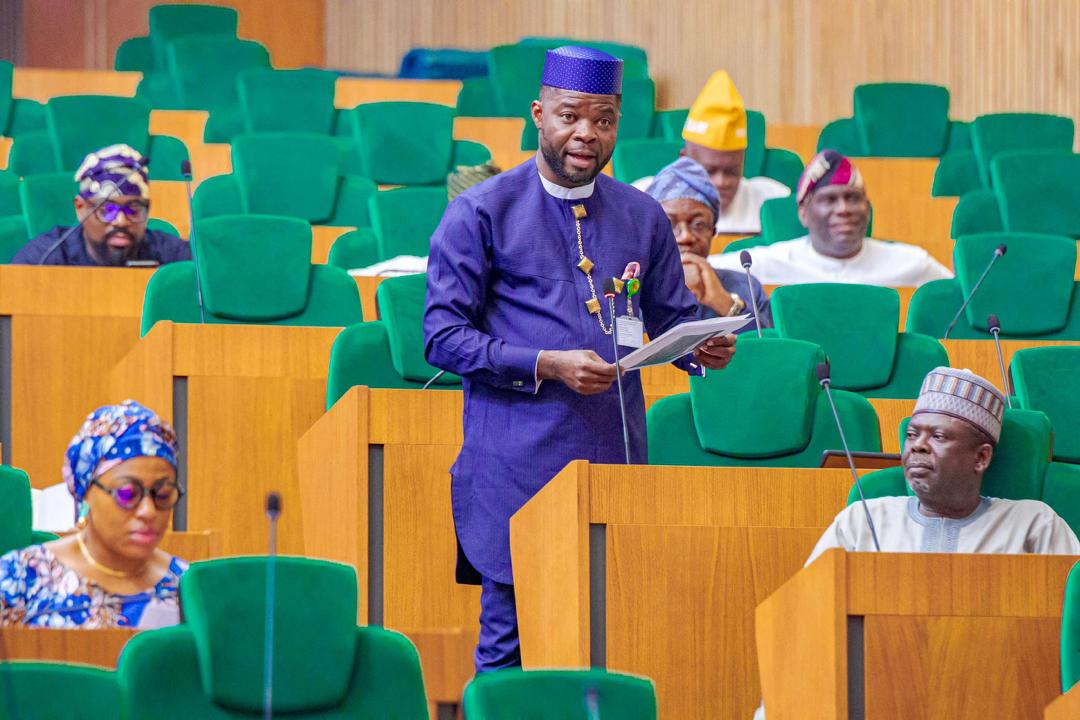567
By Lizzy Chirkpi
In a moment of rare institutional self-reflection, the House of Representatives has sounded the alarm over what it describes as an escalating crisis of judicial inconsistency and conflicting court judgments across Nigeria, situation it warns could jeopardize the country’s democracy and constitutional integrity.
The issue was brought to national attention by Hon. Clement Jimbo, representing the Abak/Etim Ekpo/Ika Federal Constituency in Akwa Ibom State. Speaking under Order 8 Rule 6 of the House Standing Orders recently, Jimbo decried what he called a troubling pattern of judicial decisions that are either contradictory, unclear, or outrightly disregarded by government institutions.
Citing the ongoing standoff involving Senator Natasha Akpoti-Uduaghan and Senate President Godswill Akpabio, Jimbo highlighted the Senate’s failure to comply with a Federal High Court ruling ordering Natasha’s reinstatement. The Senate’s refusal to obey the judgment has drawn criticism from civil society groups, including the Human Rights Writers Association of Nigeria (HURIWA), which sees it as a blatant disregard for judicial authority.
But this is just one instance in a growing catalogue of contradictory rulings that threaten public confidence in the judiciary and the rule of law.
As Nigeria approaches yet another cycle of state elections, the judiciary faces an urgent test: Can it deliver the legal clarity and consistency required to uphold democratic governance? Or will persistent contradictions further entrench political instability and erode what remains of public trust? These are questions on the lips of many.
The Nigerian judiciary has in recent months issued several contradictory rulings in high-stakes political cases, leaving electoral bodies, political parties, and citizens confused and disillusioned.
Labour Party Leadership Tussle: Abure vs Apapa
Perhaps the most visible example is the leadership crisis within the Labour Party, where Julius Abure and Lamidi Apapa have each secured court orders affirming themselves as party chairman. While courts in Abuja issued rulings favoring one side, courts in Edo State supported the other creating a legal stalemate that has paralyzed party operations and confused the Independent National Electoral Commission (INEC).
PDP’s Regional Factional Disputes
The Peoples Democratic Party (PDP) has also been plagued by court-induced chaos, with conflicting rulings over zonal leadership in the North Central and South-South regions. Different court orders have recognized different faction leaders at varying times, leading to parallel party structures and conflicting candidate submissions ahead of elections.
Zamfara and Rivers APC Primary Battles
Before the 2019 elections, the APC faced legal chaos over its primaries in Zamfara and Rivers states. While some courts upheld the primaries, others nullified them. The Supreme Court eventually disqualified the party from participating in the Zamfara elections—an outcome that was both decisive and hotly debated.
Cross River and Ogun PDP Conflicts
Cross River State recently witnessed parallel primaries held by two APC factions, with courts delivering conflicting judgments on which was legitimate. In Ogun State, the internal dispute between PDP stalwarts Ladi Adebutu and Segun Sowunmi produced inconsistent rulings from courts in Abuja and Abeokuta.
Enugu Governorship Imbroglio
In Enugu, the Labour Party’s governorship candidacy became a legal seesaw, with both Chijioke Edeoga and Everest Nnaji receiving favorable judgments from different courts. INEC was forced to delay recognition until an appellate court provided clarity.
Speaking to Pointblanknews.com on the issue, Hon. Jimbo reiterated the role of lawmakers in safeguarding good governance.
“These judgments should be simple, straightforward, and without ambiguity. As lawmakers, we cannot look the other way while the judiciary fuels political instability with inconsistent interpretations of the law and judges must be patriotic in their judgements,” he stated.
HURIWA condemned what he described as a sharp decline in the quality of judicial decisions.
“It shows a decline in the quality of delivery of judgments and an unambiguous show of indiscipline and lack of thoroughness on the part of judges who are afraid of powerful people in government,” he said.
“The judiciary is now generally perceived to be subservient to the executive arm of government in what is seen as state capture by the APC-led federal government. It is totally unacceptable for judges or justices to become pliant to the executive. Judges must be above board like Caesar’s wife and must exercise the judicial power conferred on them by Section 6 of the Constitution. If a judge is afraid to interpret the law without contradiction, then that judge should resign.”
Public Affairs Analyst Mr. Muktar Ahuraka expressed similar concerns about the integrity of the judiciary.
“I’m appalled by the spate of conflicting court judgments in Nigeria. This trend undermines the integrity of our judiciary and erodes public trust in the justice system. It’s imperative that our courts prioritize consistency and clarity in their rulings to uphold the rule of law and ensure justice for all Nigerians.”
Ahuraka also emphasized the need for comprehensive judicial reforms, including penalizing lawyers who shop for favorable judgments.
“Legal reforms should be made in order to curb forum shopping. The rules of court and civil procedure rules must be amended to penalize litigants and lawyers who engage in forum shopping. Also, exclusive jurisdictions should be conferred on certain courts (e.g., the Court of Appeal or designated Federal High Courts) to handle specific national or electoral disputes to prevent conflicting jurisdictional issues.”
In response to the growing concerns, the House of Representatives has resolved to investigate the issue. Lawmakers may engage both the National Judicial Council (NJC) and the Office of the Attorney General to tackle the persistent lack of judicial coherence.



